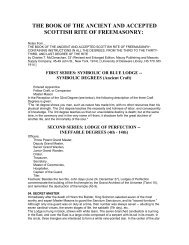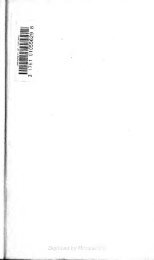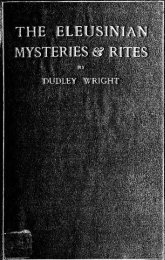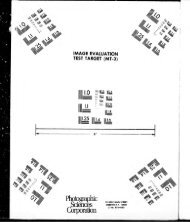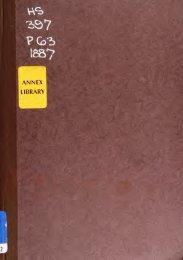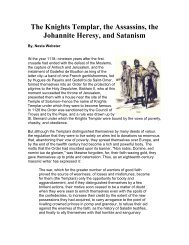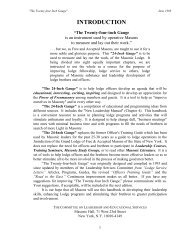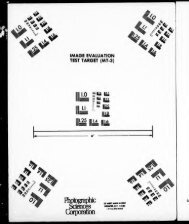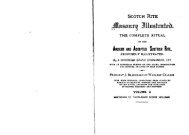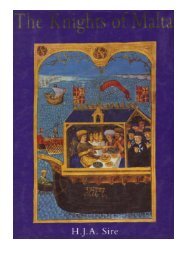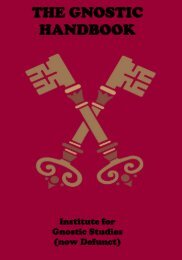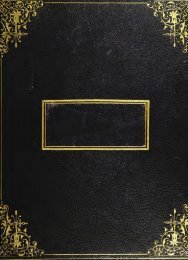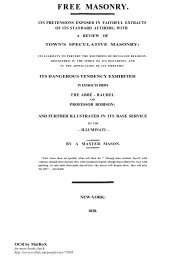The History of Initiation - The Masonic Trowel
The History of Initiation - The Masonic Trowel
The History of Initiation - The Masonic Trowel
You also want an ePaper? Increase the reach of your titles
YUMPU automatically turns print PDFs into web optimized ePapers that Google loves.
DOCTRINES AND MORALITY. 181<br />
hall <strong>of</strong> Odin, was to die in battle, covered with wounds,<br />
valiantly fighting against the enemies <strong>of</strong> his country.<br />
<strong>The</strong> most prominent symbols in these celebrations<br />
were, the Cross and Ring already mentioned; 7 the Ash<br />
tree, the Point within a Circle, the Rainbow, 8 and a Cube<br />
the emblem <strong>of</strong> Odin. 9<br />
6 When Odin perceived that his end drew nigh, " he would not wait<br />
till the consequences <strong>of</strong> a lingering disease should put a period to that<br />
life which he had so <strong>of</strong>ten bravely hazarded in the field ; but, assem-<br />
bling the friends and companions <strong>of</strong> his fortune, he gave himself nine<br />
wounds in the form <strong>of</strong> a circle with the point <strong>of</strong> a lance, and many<br />
other cuts in his skin with his sword. As he was dying, he declared<br />
he was going back into Scythia to take his seat among the other gods<br />
at an eternal banquet, where he would receive with great honours all<br />
who should expose themselves intrepidly in battle, and die bravely<br />
with their swords in their hands. As soon as he had breathed his<br />
last, they carried his body to Sigtuna (the ancient capital <strong>of</strong> Sweden),<br />
where, conformably to a custom introduced by himself into the north,<br />
his body was burned with much pomp and magnificence." (Mai.<br />
North. Ant., vol. i., p. 6.) Hence in battle the Scandinavians were<br />
inspired with the most furious bravery and contempt <strong>of</strong> death, under<br />
the impression that all who died bravely in the field would certainly<br />
be received by Odin into his paradise, designated by the endearing<br />
appellation <strong>of</strong> Valhalla, and be rewarded with an honourable seat in<br />
his presence ; there to enjoy a continual feast <strong>of</strong> warriors, served up<br />
by the Valkyriae, who were virgins <strong>of</strong> the most exquisite beauty;<br />
serenaded with martial music, and drinking hydromel or mead out <strong>of</strong><br />
the skulls <strong>of</strong> vanquished enemies, until the destruction and final renovation<br />
<strong>of</strong> the earth and heavens. <strong>The</strong> Edda (Fab. 20) thus describes<br />
these envied joys, which incited the barbarians <strong>of</strong> Northern Europe to<br />
court death in every violent shape ; and inspired an undefined horror<br />
"<br />
at the prospect <strong>of</strong> a death proceeding from disease or old age. <strong>The</strong><br />
heroes who are received into the palace <strong>of</strong> Odin, have every day the<br />
pleasure <strong>of</strong> arming themselves, <strong>of</strong> passing in review, <strong>of</strong> ranging themselves<br />
in order <strong>of</strong> battle, and <strong>of</strong> cutting one another in pieces but as<br />
;<br />
soon as the hour <strong>of</strong> repast approaches, they return on horseback, all<br />
safe and sound, back to the Hall <strong>of</strong> Odin, and fall to eating and drinking<br />
<strong>The</strong>ir beverage is beer and mead their ; cups are the skulls<br />
<strong>of</strong> enemies they have slain. A crowd <strong>of</strong> virgins wait upon the<br />
heroes at table, and fill their cups as fast as they empty them."<br />
in his<br />
(Mai. North. Ant., vol. i., p. 120.) Hence Ragnor Lodbrok,<br />
death song, consoles himself with this reflection, "I shall soon drink<br />
beer from hollow cups made <strong>of</strong> skulls." (St. 25 Worm. Liter. Dan. }<br />
p. 203. Jamieson, Scot. Diet., v. Skul. Mai. North. Ant, vol. p. 232.)<br />
ii.,<br />
7 Vid. ut supra, p. 265.<br />
8<br />
" <strong>The</strong> Ash tree Udrasil," says the<br />
Signs and Symbols, Lect. 8, 9.<br />
Edda, (Fab. 20,) " is the greatest <strong>of</strong> trees ; Skidbladner, <strong>of</strong> vessels ;<br />
Odin, <strong>of</strong> gods ; Slcipner, <strong>of</strong> horses ; JBifrost, <strong>of</strong> bridges ; Brage, <strong>of</strong><br />
scalds or poets; Habroc, <strong>of</strong> hawks ; and Garmer, <strong>of</strong> hounds."<br />
9 Fab. Mys. Cab., vol. i., p. 308.



